Hair loss or baldness is the stage of losing scalp hair faster than its growth. Everyone is going to crazy lengths to prevent major hair loss. Men are specifically much affected by this problem and are thus looking for ways to stop losing hair. Hair loss may be temporary or permanent as part of the aging process or genetics.
For preventing hair loss, particularly men who are interested or are already on Testosterone Replacement Therapy (TRT) for Low Testosterone or Hypogonadism are curious about knowing if TRT can affect hair loss.
TRT and hair loss are becoming a hot topic of discussion in this regard. Men all across the globe are busy finding out the most effective solution to their hair loss problem, and thus they’re questioning the efficacy of testosterone therapy.
So, we at Alpha Hormones® are here to see “Does TRT affect hair loss?” And how your age, hormones, and genetics are related to your hair loss, and what you can do to prevent it.
Does TRT Affect Hair Loss?
Testosterone Replacement Therapy, commonly known as TRT, has piqued the interest of many men. The therapy involves steps that increase testosterone levels inside the body.
As testosterone is the male sex hormone, you might be wondering “How it can affect my hair?” Originally, this male hormone is not only responsible for carrying out sexual processes, but it also causes stimulation of secondary hair in the body. This is exactly why TRT can be effective in treating hair loss.²
If you are interested in or currently on TRT, you must be worried about its effects on your hair. To understand testosterone effects on hair follicles, you must know about the relationship between testosterone and dihydrotestosterone (DHT). DHT is a synthetic form of testosterone that is formed by the reduction of testosterone hormone in the presence of enzyme, 5α-reductase. DHT plays an important part in terms of hair loss.
The point of argument which stands against the effectiveness of TRT is the effects of DHT, a bi-product of testosterone, on hair loss. When testosterone is catalyzed to form DHT, it disrupts the natural predisposition of hair follicles to cause hair loss.¹⁷
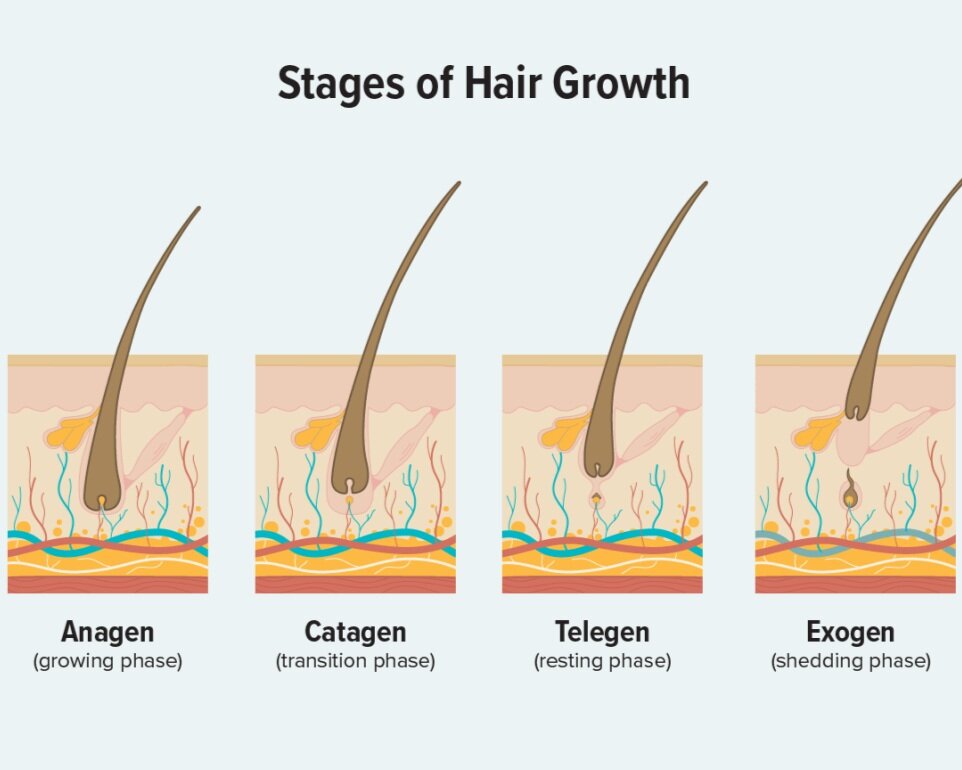
The hair growth cycle is based on four distinct phases.
- Anagen (hair growthing phase)
- Catagen (transition phase)
- Telogen (resting phase)
- Exogen (shedding phase)
DHT mainly affects the anagen (hair growth phase) and the telogen (resting phase). It slows the growth and prolongs the resting condition of hair follicles.
But these are not the norms of every case. In most cases, hair growth is not much affected by TRT. While in some cases, people experience hair loss in the starting days as shocking results of TRT. This is due to the sudden change that occurs in the normal resting condition of their body. Most of them begin to soon familiarize with the therapy as time passes by and start showing no negative signs.¹⁸
Since every human body has its own separate characteristics, there comes into play the human genetics. The genetic disposition of every individual person plays a greater part in estimating the effects of TRT on hair loss.
Effect Of Genetic Depositions On Hair Loss
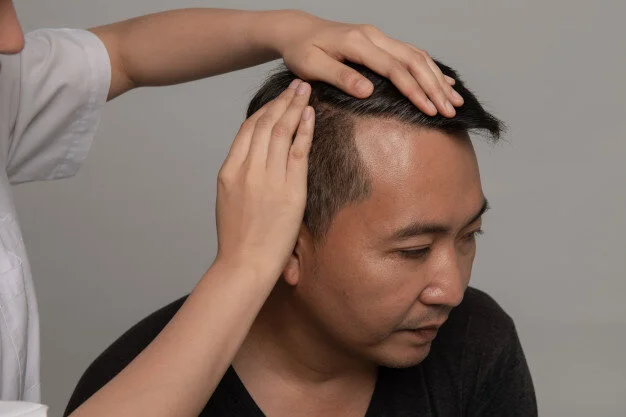
In terms of genetics, baldness or hair loss in man and woman is not related to the levels of testosterone or DHT. Instead, the hypersensitivity of the hair follicles present on the scalp is what determines the effects of hormones. That sensitivity is determined by genetics. ⁴
A gene called the AR gene is responsible for the sensitivity of hair follicle. The gene regulates the number of the receptor present on the hair follicles where the hormone is supposed to bind and produce its effect.¹⁰
When these receptors become hypersensitive, even the small amounts of DHT can trigger the receptors and the interaction may result in hair loss. Similarly, there are other gene-based receptor interactions which are significant in determining the cause of hair loss.
Other factors such as stress, age and quality of life also influence hormone effects and receptor interactions. If one family has a history of baldness or hair loss, there is a higher probability of the individual suffering similar condition at some point in his life.⁸
Age-Related Hair Loss
As men get older, their body starts losing its capabilities of synthesizing and maintaining normal testosterone levels. This causes a gradual decrease in testosterone in the body. But besides age related conditions, many cases have been reported that show that hereditary and genes also play a major role in causing hair loss.⁵
Hair loss or baldness can also be caused by the aging of the human body. In this condition, the person aged between the 20s to 30s starts to lose more hair than normal conditions. This is mainly because as the body grows old, it starts producing decreased levels of testosterone hormone. This disrupts the normal hair growth cycle.⁶
As we get old, an age-related decline occurs in testosterone levels. This is referred to as male menopause caused by age-related hypogonadism. In this condition, the gonads start losing their efficiency and producing less testosterone. This impacts on your hair follicles ability and overall hair growth cycle is affected. Soon the follicles become sensitive and start producing thinner and lesser hair. Thus, baldness starts to occur.⁷
Effects Of Testosterone And DHT On Hair Follicles
The effects of Testosterone and DHT on hair loss can be seen in the following two aspects which are interconnected.
Role Of Testosterone
Testosterone, being the dominant male hormone, keeps the body of men healthy and masculine. It is responsible for
- Secondary hair growth
- Strengthening bones
- Building up muscle mass
- Stabilizing mental state in terms of focus, motivation, etc.
A body lacking in proper testosterone levels may suffer from various problems including hair loss. That’s one reason why a male experiencing hair loss might be at risk of testosterone deficiency.²
Role Of DHT
Although DHT regulates many different functions inside the human body, along with that, it reduces the hair follicle size. The reduced follicle size gradually results in the reduction of hair growth. Ultimately, the reduction leads to a point where hair completely stops growing and results in Male Pattern Baldness.
Is There Scientific Evidence For TRT Causing Hair Loss?
In Testosterone Replacement Therapy (TRT), the patient is given external testosterone. Therefore, many people believe that increased testosterone levels may produce increased DHT inside the body which will ultimately result in loss of hair and cause baldness.²⁰
Another reason which leads to the assumption that TRT may affect hair loss adversely is the bi-product of testosterone. Since the testosterone levels of the body are increased due to therapy, it may produce DHT which disrupts the natural predisposition of hair follicles present on the head. Due to which some people may experience a reduction of hair growth in the beginning of treatment.¹
But these are all assumptions that are yet to be supported by solid scientific research. Countless studies and researches have been done on this particular topic, but the findings always show contradictory results of Testosterone Replacement Therapy due to varying age and genetic factors. Ultimately, it all comes down to the hereditary differences of individuals that may lead to hair loss caused by TRT in some man while others show a symptomatic positive response.¹⁸
Medicated Treatments
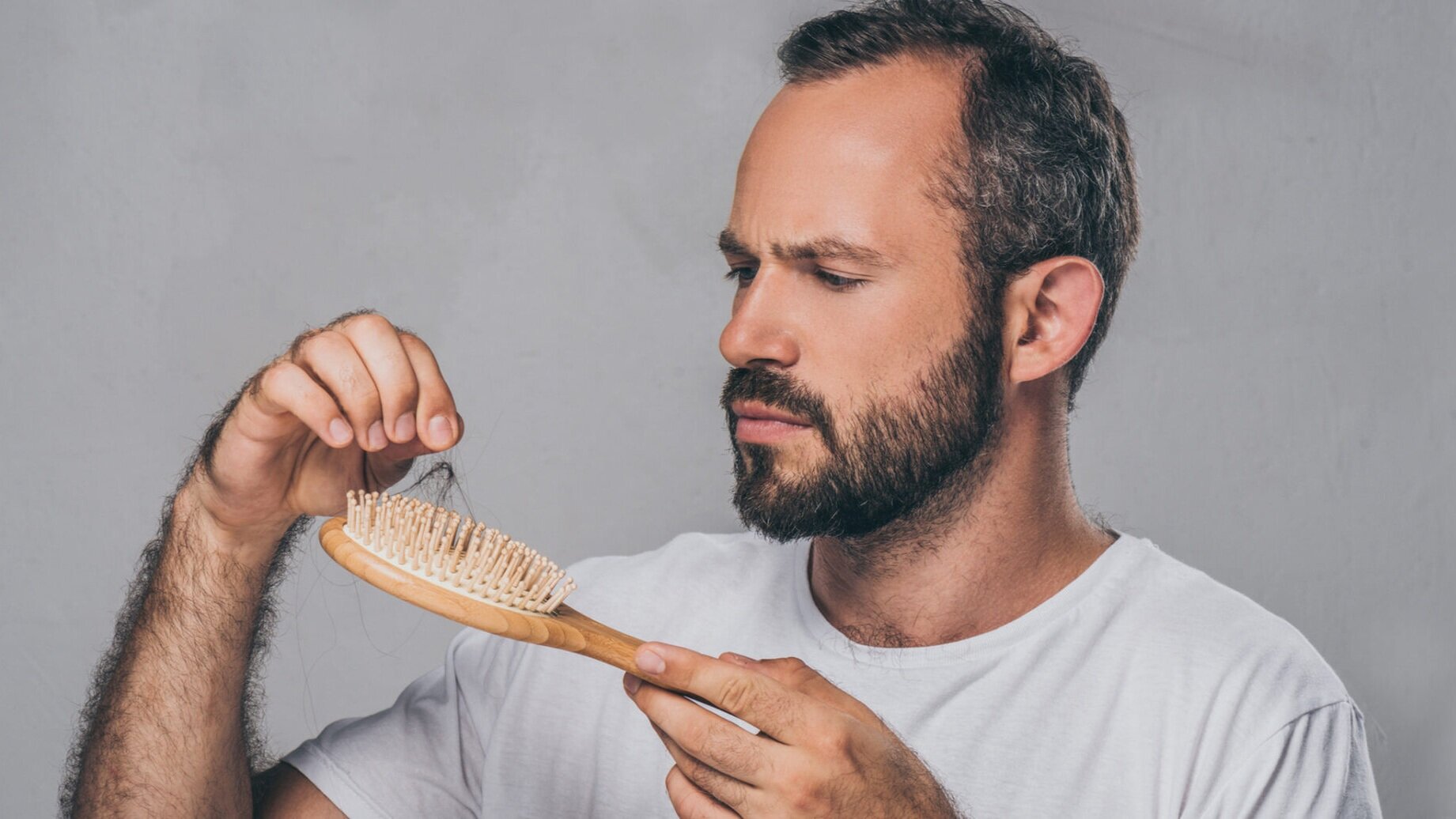
Finasteride
Finasteride is usually available as Proscar or Propecia. This medication is well supported by many documented reviews and researches. According to research, Propecia has a success rate of approximately 87 %, and that too with negligible side effects.⁸
Propecia works by blocking the DHT molecules from binding to the 5-AR proteins. This way it stays away from the hair follicle receptor sites and doesn’t affect them. Thus, your hair follicles remain the same and no shrinking takes place resulting in no reduction of hair growth.⁸
Minoxidil
Minoxidil, also known as Rogaine, acts as a peripheral vasodilator. It directly acts on the blood vessels and helps in widening their diameter. The small blood vessels become wide and loosen so more volume of blood can pass through them easily.⁹
This increases the blood circulation of the scalp and nutrition hair growth. It can be topically applied on the scalp in the form of tonic or hair solution to prevent hair loss.⁹
Ketoconazole
Ketoconazole, an anti-fungal medication, can also be effective in stimulating new hair growth for sufferers of Androgenic Alopecia. DHT is the hormone responsible for shrinking hair follicles in people who have this condition. In addition to killing fungi, ketoconazole is also helpful in countering the effects of DHT and promotes hair growth.¹⁶
Latanoprost
A double-blind scientific study published in the May 2012 issue of the Journal of the American Academy of Dermatology has found that latanoprost, a drug that mimics naturally-derived compound molecules called prostaglandins, significantly increases hair density on the scalp after 24 weeks of treatment in young men with mild hair loss. Latanoprost, like the eyelash restoration drug bimatoprost (better-known by its brand name Latisse), has been used to treat glaucoma. And like bimatoprost, latanoprost has been used to treat eyelash alopecia. The scientists who conducted the study sought to determine if latanoprost could stimulate hair growth when applied topically on the scalp.
Azelaic Acid
A naturally occurring substance found in whole grains that contains a mild antibiotic designed to reduce harmful bacteria from the skin. It is also said to be a potential inhibitor of 5-alpha-reductase in human skin. A reduction of this enzyme reduces the amount DHT in the body and therefore can have a similar effect to finasteride; the active ingredient in the FDA approved oral hair loss solution Propecia.
GHK-Cu Foam
The GHK-Copper foam in this medication identifies the presence of naturally occurring copper. This medication is a copper complex that regulates various activities in the human body including stimulation of hair follicles and promotion of growth of blood vessels. The concentration of GHK-Cu determines the outcome of any hair treatment or therapy that may affect hair loss. This medication can be taken to prevent hair loss and promote hair follicles to produce longer, thicker, and strong hair.¹³
Biotin Supplement
Biotin or Vitamin H is obtained from the naturally occurring Vitamin B. The vitamin is responsible for producing energy inside the body when you consume food.
Biotin is also capable of regulating keratin levels inside the body. This helps to boost hair growth directly because the hair structure is made of keratin proteins. Biotin is a very important component that can even grow hair in areas where hair growth is stopped. It also prevents hair from falling out.
Conclusion

If you’re worrying about hair loss or afraid to start testosterone because you think you’re going to be bald while on Testosterone Replacement Therapy (TRT), you should put that fear to the side. TRT is a safe and effective treatment to improve your overall energy, libido, mood, performance, and more importantly your quality of life. You can be confident to try it out yourself and see the results in mere weeks. There’s no harm in trying out TRT that does not cause hair loss, but on the contrary also regulates other male dominant characters inside the body. There are ways which can slow down aging and decline of testosterone levels and prevent hair loss, make sure to book an appointment with a physician at Alpha Hormones® to discuss your treatment options.
References
- Rhoden EL, Morgentaler A. Risks of testosterone-replacement therapy and recommendations for monitoring. N Engl J Med. 2004;350(5):482–492
- Hans U. Schweikert, Jean D. Wilson. Regulation of Human Hair Growth by Steroid Hormones. I. Testosterone Metabolism in Isolated Hairs. The Journal of Clinical Endocrinology & Metabolism, Volume 38, Issue 5, 1 May 1974, Pages 811–819,
- Bhasin S, Buckwalter JG. Testosterone supplementation in older men: a rational idea whose time has not yet come. J Androl. 2001;22:718–731
- Leona Yip, Nick Rufaut, Rod Sinclair. Role of genetics and sex steroid hormones in male androgenetic alopecia and female pattern hair loss. Australasian Journal of Dermatology 52 (2), 81-88, 2011
- Hair loss, insulin resistance, and heredity in middle‐aged women. A population‐based study. J Cardiovasc Risk 2003; 10: 227– 31.
- Glaser R, York AE, Dimitrakakis C. Beneficial effects of testosterone therapy in women measured by the validated Menopause Rating Scale (MRS). Maturitas 2011; 68: 355– 61.
- Feldman HA, Longcope C, et. al. Age trends in the level of serum testosterone and other hormones in middle-aged men: longitudinal results from the Massachusetts male aging study. J Clin Endocrinol Metab. 2002;87(2):589–98
- Yeap BB, Almeida OP, Hyde Z, et al. In men older than 70 years, total testosterone remains stable while free testosterone declines with age. The Health in Men Study. Eur J Endocrinol. 2007;156:585–594.
- Elise A Olsen, Andrew G Messenger, Jerry Shapiro, et. al. Evaluation and treatment of male and female pattern hair loss. Journal of the American Academy of Dermatology 52 (2), 301-311, 2005
- Shigeki Inui, Satoshi Itami. Androgen actions on the human hair follicle. Experimental dermatology 22 (3), 168-171, 2013.
- Rodney Sinclair, Minoo Patel, TL Dawson Jr, et. al. Hair loss in women: medical and cosmetic approaches to increase scalp hair fullness. British Journal of Dermatology 165, 12-18, 2011
- Przemyslaw M Plonka, Bori Handjiski, et. al. Zinc as an ambivalent but potent modulator of murine hair growth in vivo– preliminary observations. Experimental dermatology 14 (11), 844-853, 2005
- Mohamed Zoughaib, Duong Luong, Ruslan Garifullin, et. al. Enhanced angiogenic effects of RGD, GHK peptides and copper (II) compositions in synthetic cryogel ECM model. Materials Science and Engineering: C, 111660, 2020
- Kaufman KD, Olsen EA, Whiting D et al. Finasteride in the treatment of men with androgenetic alopecia. J Am Acad Dermatol 1998; 39: 578–89
- Jonathan R., Matias Ms., Norman Orentreich Md. The effect of testosterone, cyproterone acetate, and minoxidil on hair loss in the androchronogenetic alopecia mouse. Clinics in Dermatology. 1988, Volume 6, Issue 4,169-176.
- Ju Jiang, Ryoji Tsuboi, et. al. Topical application of ketoconazole stimulates hair growth in C3H/HeN mice. The Journal of dermatology 32 (4), 243-247, 2005
- Steven Thomson, Gideon Koren, et. al. Testosterone concentrations in hair of hypogonadal men with and without testosterone replacement therapy. Therapeutic drug monitoring 31 (6), 779-782, 2009
- Nazem Bassil, Saad Alkaade, et. al. The benefits and risks of testosterone replacement therapy. Therapeutics and clinical risk management 5, 427, 2009
- Baum N, Candace A, Crespi CA. Testosterone replacement in elderly men. Testosterone replacement in elderly men. Geriatrics. 2007;62:15–18
- KD Kaufman, EA Olsen, et. al. World Hair Research. J Am Acad Dermatol 39 (4 Pt 1), 578-89, 1998
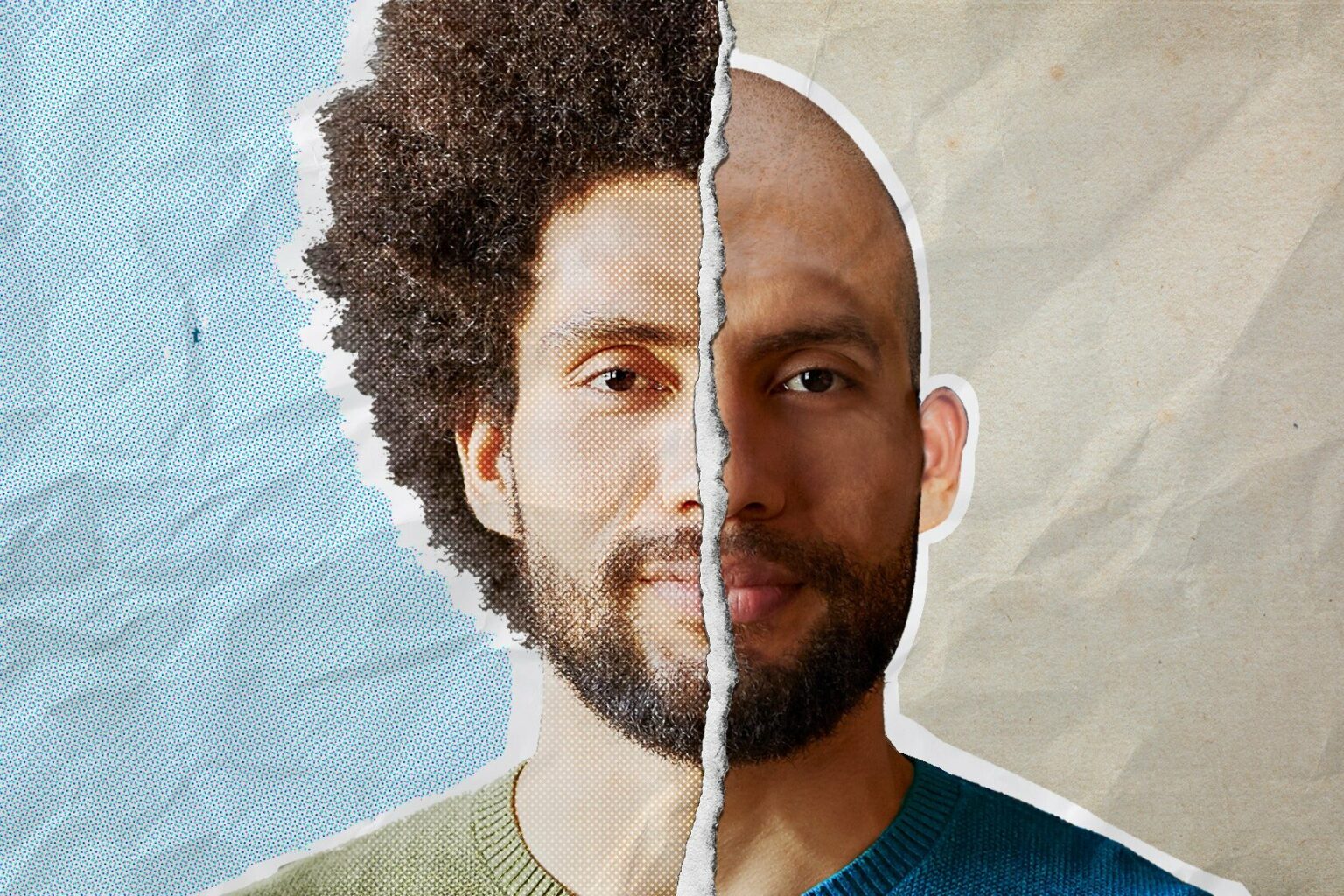





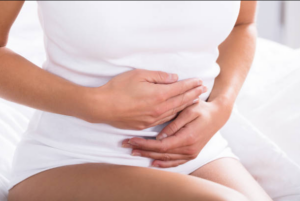






4 Responses
Can you be more specific about the content of your article? After reading it, I still have some doubts. Hope you can help me.
Thanks for sharing, this is a fantastic post.Really thank you! Fantastic.
A round of applause for your article.Really thank you! Keep writing.
Great, thanks for sharing this article post.Really thank you!